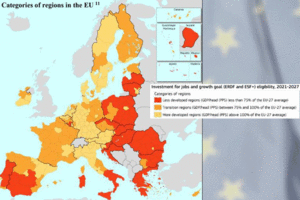News
What are the priorities for future cohesion policy?
July 2023
Introduced by Elisa Ferreira, European Commissioner for Cohesion and Reforms, the group of experts on the future of cohesion policy met for its 5th session on the theme of "Strengthening territorial cooperation and meeting the challenges of European integration".
The first part of the public session focused on academic contributions, with speeches by Eduardo Medeiros, professor of geography and researcher at the University of Lisbon, and Hynek Böhm, associate professor of regional and social development at the Technical University of Liberec.
Eduardo Medeiros highlighted the fact that Interreg is at the heart of cohesion policy. Its strategic priority is the reduction of border barriers and the development of territorial capital. "Joint strategies are needed for transnational issues relating to the environment (self-sufficient cities), demographics, accessibility, and the economy. As borders are all very different, the future cohesion policy requires flexibility and a strategic approach rather than a thematic one".
For Hynek Böhm, Interreg is a key instrument for overcoming the border barrier. He emphasised the very high cost of the lack of cross-border cooperation. "At external borders, cross-border cooperation above all requires trust. The two priorities for future cohesion policy are simplification and better-endowed micro-project funds".
During the second part of the session, the institutional contributions of Wiktor Szydarowski, Director of ESPON, and Martin Guillermo-Ramirez, Secretary General of the Association of European Border Regions (AEBR), were presented.
Wiktor Szydarowski outlined ESPON's work over the last 20 years. "A multi-level and territorialised approach, both bottom-up and top-down, is necessary for cooperation. In order to find solutions to cross-border obstacles, we need to promote good practices and pay attention to macro-regional strategies". For future cohesion policy, he suggested leaving more room for experimentation and pilot cooperation actions.
For Martin Guillermo-Ramirez, the emphasis must be placed on both internal and external borders, as the latter can change rapidly. "The involvement of young people in cooperation should be supported, as in the case of Interreg volunteers. We must continue to resolve the obstacles to cooperation, such as the language barrier, which was clearly identified during the B-solutions". His main suggestion for the future was a significant increase in the budget dedicated to cooperation.
Andrés Rodriguez-Pose of the London School of Economics concluded by recalling the cost of the lack of cross-border integration, the need for cross-border institutions, for a larger budget and for taking into account the diversity of situations at borders. The ultimate goal of the European Union is "one Europe, one system".
More info and documents relating to the meeting
Photo : © Commission européenne et Adobe stock

